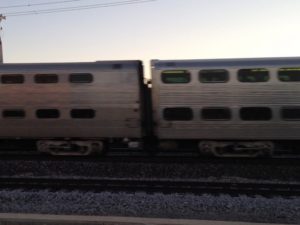Assisting Chicago Metra Train Accident Victims

The Chicago Metra Rail System is a commuter rail service in the Chicago metropolitan area. The System currently operates 242 stations and has 11 separate rail lines. Moreover, it is the fourth busiest commuter rail system in the United States. Over 80 million passengers utilize the system. However, the breadth of the Chicago Metra train system makes the potential for accidents all the more likely.
In order to recover compensation in a Chicago Metra injury case, a passenger must be able to demonstrate that the train operator, Metra, or some other entity or agency was responsible for causing the accident. Every personal injury train accident case consists of two components: liability and damages. The liability portion of the case goes to fault, or responsibility, for the accident. Damages is the amount necessary to compensate the accident victim.
In most train accident cases Metra will try to limit their liability exposure to the greatest extent possible. Therefore, it is important that you have a Chicago Metra train accident lawyer representing you.
If you sustain serious injuries and damages in a Metra collision, the Chicago train accident attorneys at Abels & Annes, P.C. may be able to help. We will look to prove the legal elements of your personal injury claim, including your injuries and damages.
Mechanics of Injury
During a Metra train accident, passengers can be thrown around the rail car. They can also be violently knocked forwards and backwards in their seats. This can lead to the potential serious injuries. Metra trains are often very full – especially during rush hour – with people standing. An accident can throw passengers to the floor or against a fixed object. They may suffer a broken bone or serious closed head injury, such as a traumatic brain injury.
Proving Responsibility on the Part of the Metra Train Operator
In order to successfully prove negligence against the train operator, the injured train passenger must be able to show that the operator deviated from the standard of care. A Metra train operator may violate the standard of care by engaging in distracted operation or by operating the train in a careless, reckless, or negligent manner under the circumstances. For example, exceeding the posted train speed limit. An operator may also violate the standard of care if he or she is under the influence of drugs or alcohol.
Assuming the train driver engages in negligent operation, the accident victim must also be able to show that this violation resulted in injury and damages. Injuries originating from some other source are generally not compensable as part of a personal injury case. However, if the Metra train accident exacerbates a preexisting injury or medical condition, the victim may establish liability. This would be to the extent that the accident made that injury or condition worse.
If the train driver was driving carefully and did not do anything wrong, the plaintiff must show the negligence of another party. For example, another train operator may have been at fault. Or, in some cases train dispatchers could ultimately be on the hook for negligence if they fail to do their jobs correctly and a train accident ensues.
A Chicago Metra train accident attorney can take appropriate legal action against a negligent operator who causes a collision.
Proving that Metra or Some Other Governmental Entity Was Negligent
Metra is controlled by the State of Illinois and operated by its subsidiary, the Northeast Illinois Regional Commuter Railroad Corporation. This entity was created as a separate rail subsidiary which operates seven different Metra routes. Metra also contracts with the Union Pacific and the BNSF Railways to operate four additional Metra routes.
In addition to naming the negligent train operator as a liable party, an injured passenger could – and probably should – name Metra or one of its subsidiaries as potential defendants when filing a personal injury claim or lawsuit. Any of these governmental or quasi-governmental entities can be vicariously liable for the train driver’s negligence, as well as for all of the train passenger’s injuries and damages. In order for Metra or one of its subsidiaries to share in some or all of the potential liability, the following must be true:
- The at-fault train operator must have been working for Metra at the time of the accident
- The train operator must have been acting within the scope of his or her employment
- The injured train passenger may also be able to allege that Metra or one of its subsidiaries was negligent in hiring, retaining, or supervising the train operator. This is especially so in cases where the operator has a prior history of accidents, moving violations, or infractions.
A Chicago Metra train accident attorney can ensure that all of the proper defendants are brought into your case. Further, he or she will timely file a claim or lawsuit is filed.
Call a Chicago Metra Train Accident Lawyer for Legal Help
A Metra accident lawyer can review your case and may be able to help you prove fault and damages. Claims adjusters are not on your side and they vigorously defend Metra train accident cases. You need a lawyer on your side who will fight for your right to recover compensation for your injuries. The attorneys at Abels & Annes, P.C. can negotiate with the at-fault party on your behalf or take your case to trial to reach a favorable resolution.
To receive a free consultation and case evaluation, please call us today at 312-924-7575 or contact us online.